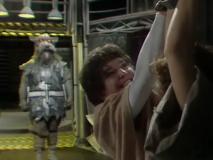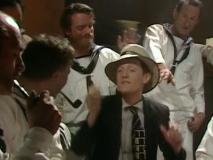Recapping some of the recent developments in the press in Australia:
The Age calls John Barrowman "a man's man ... a new kind of hero with a flexible sexuality" according to writer Tim Hunter. "The new series of Doctor Who has grown up. ... It is also a lot more sophisticated than the classic series and not just in terms of effects and technology. There's a great deal of cleverness in the scripts, in the humour, the characters and their relationships. You need not look any further than the Doctor's new companion, Captain Jack Harkness, for evidence of that." The story interviews Barrowman about his experiences on the show. "Women like to look at good-looking men and men like to look at good-looking men. The amount of letters I've received via my website and agent from men watching the show with their wives, and making the joke at the end of the letter - I kid you not - 'If anyone could turn me, my wife and I decided, Captain Jack could!'"
ABC.net.au also featured a story about Barrowman, noting that "John Barrowman was better known as a Broadway and West End darling when he was given the role of 51st Century time agent Captain Jack Harkness in the new series of Doctor Who. As an American actor based in London, John never expected this chance to feature in one of his favourite childhood shows, but as a long-time fan of the Doctor, he was overjoyed at the news."
The
Sydney Morning Herald last week praised "Boom Town": "Was Doctor Who, before this revival, ever quite so humorous? Tonight, the Time Lord, Rose and Jack land the Tardis in Cardiff, a city that has a scar in the rift (a closed time rift apparently useful for powering up the batteries of the Tardis) that runs through the heart of the city. Mickey Smith travels to Cardiff at Rose's request with her passport - a redundant document really, given her habit of intergalactic travel. The down time promises to give Rose and Mickey a chance to work through some relationship issues, until the true identity of the city mayor - who has approved plans to build a nuclear reactor in the middle of Cardiff - is uncovered. Annette Badland is brilliant as the conniving and vicious Slitheen, occupying the body of Margaret Blaine." Last week's
The Age (28 July) also reviewed the episode: "Make the most of Doctor Who, because he's not long for this world. Christopher Eccleston, that is, the man who has breathed new life into the first genuinely intergalactic TV brand. Soon we'll have David Tennant, and, like me, if you've been grateful to old jug-ears - as he almost gets called in tonight's episode - then wallow in his over-acting for a few more weeks. Tonight brings back an old friend who almost manages to plunge the doctor into a vat of moral ambi-guity. In the end it's not that complicated. When he gets the better of the Mayor of Cardiff - really - she asks him: "What did I do to you?" To which he replies: "Try to kill me and destroy this planet." So it seems quite reasonable that she should get a taste of her own medicine. Russell Davies, the man behind this new incarnation of Doctor Who, has a lot of fun with this episode. There's a rift in time and space - of course, what else could there be? It is Doctor Who, after all - and all sorts of weird and very wonderful devices, including a pan-dimensional surfboard. Every surfer should have one. See you at Bells Beach in the year 3000?" The
Sunday Herald Sun said of the episode, "This engaging and witty series seems to reach new heights each week. This week, the Tardis is parked on a time rift in the center of Cardiff to refuel, and the Doctor is horrified to discover the mayor of the city is none other than porky Margaret Blaine (the excellent Annette Badland), the matriarch and last surviving member of the murderous alien Slitheen family."
Last week's "The Doctor Dances" also rated a comment from
The Herald: "It's wartime London and the Blitz is growing in intensity. As last week's episode ended, the Empty Child was walking menacingly towards Nancy the street urchin while the zombie army of dead gas mask children was coming to life and advancing on the Doctor. Now the child plague is spreading alarmingly. That's one corner of this story, while Richard Wilson (One Foot in the Grave) takes another and Rose Tyler, the doctor's companion, is falling for the handsome intergalactic conman, Group Captain Jack Harkness (John Barrowman). Strains of Glenn Miller's Moonlight Serenade prompt Rose to taunt the Doctor about his lack of dancing ability. Stand by for a delightful finish as the Doctor gets In the Mood."
On 29 July the
Sydney Morning Herald ran a feature on the now-ended "Inside the TARDIS" tour. "There's a huge difference between what we're doing on this show and a convention, where you have hundreds and hundreds of fans from all sorts of walks of life," says Katy Manning. "There's hardly anybody, whether it be in the '60s, '70s, '80s or '90s, who hasn't experienced the Tardis or doesn't know about Doctor Who. A lot of blokes have said to me, 'Do you realise you were my first fantasy?'" Manning also appeared on the Australian version of
This Is Your Life which was dedicated to her partner Barry Crocker. The
Courier Mail interviewed Sylvester McCoy on location during the tour, on 23 July. "Crossing time zones should be a breeze for actor Sylvester McCoy, who traversed the universe for three years as Dr Who. Apparently not. Having just arrived in Melbourne from London, he is disoriented and confesses to having no idea what day it is. The confusion continues when he can't remember the last time he was in Australia for a Dr Who convention. ... 'Could it have been five years ago? Um, I can't really remember'." McCoy says that "I have been all over the world with Dr Who. I've done conventions, I've done cruises, I've done everything. It has changed my life. I love travelling and it has enabled me to do so."
The Age on 21 July reviewed "Dalek": "I never thought I'd see the day when a Dalek - one of the Doctor's most bloodthirsty adversaries - would turn into a kind of namby-pamby existentialist. In episode six of the new series, the evil genetic freak learns that it is the last of its kind - the sole survivor of a devastating time war. In a low voice it laments, 'I am alone in the universe'. Now, this isn't meant to be comedy, but it's a laugh-out-loud moment. It belongs in bad alternative theatre, not the more mature entertainment that the revamped series of Doctor Who is striving to be. It is an uneven production that wears its heart on its sleeve. This is probably most apparent in the characterisation of the Doctor. Previous Doctors tended to be foppish, aloof and imperious. Christopher Eccelston's Doctor wears black and looks like a heavy in a Guy Ritchie film. He is volatile, manic, insecure and proudly working class. With his Mancunian accent and cropped hair, he could be a truck driver in The Bill. Eccleston makes for a solid contemporary Doctor. When he first encounters the dreaded Dalek of episode six, his fear is palpable. Eccleston makes you feel that the years of time travelling have messed with his head and that deep down this Doctor is sad, lonely and jaded. Saving the universe from alien tyrants has come at a substantial personal cost. It all gives this series an emotional clout the old program never had. ... The problem lies with the scripts. The plotting of the episodes is wildly uneven. ... The real marvel of this venerable program is not that the Doctor is able to regenerate; the real miracle is that the program itself has regenerated and found a fresh audience more than 40 years after it all began."
(Thanks to Steve Tribe, Paul Engelberg, Adam Kirk, Michael Davoren)



















